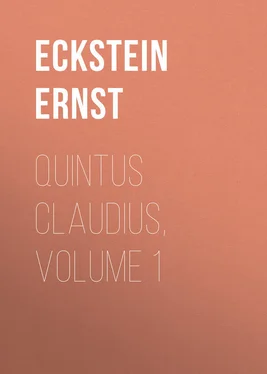Ernst Eckstein - Quintus Claudius, Volume 1
Здесь есть возможность читать онлайн «Ernst Eckstein - Quintus Claudius, Volume 1» — ознакомительный отрывок электронной книги совершенно бесплатно, а после прочтения отрывка купить полную версию. В некоторых случаях можно слушать аудио, скачать через торрент в формате fb2 и присутствует краткое содержание. Жанр: foreign_antique, foreign_prose, на английском языке. Описание произведения, (предисловие) а так же отзывы посетителей доступны на портале библиотеки ЛибКат.
- Название:Quintus Claudius, Volume 1
- Автор:
- Жанр:
- Год:неизвестен
- ISBN:нет данных
- Рейтинг книги:4 / 5. Голосов: 1
-
Избранное:Добавить в избранное
- Отзывы:
-
Ваша оценка:
- 80
- 1
- 2
- 3
- 4
- 5
Quintus Claudius, Volume 1: краткое содержание, описание и аннотация
Предлагаем к чтению аннотацию, описание, краткое содержание или предисловие (зависит от того, что написал сам автор книги «Quintus Claudius, Volume 1»). Если вы не нашли необходимую информацию о книге — напишите в комментариях, мы постараемся отыскать её.
Quintus Claudius, Volume 1 — читать онлайн ознакомительный отрывок
Ниже представлен текст книги, разбитый по страницам. Система сохранения места последней прочитанной страницы, позволяет с удобством читать онлайн бесплатно книгу «Quintus Claudius, Volume 1», без необходимости каждый раз заново искать на чём Вы остановились. Поставьте закладку, и сможете в любой момент перейти на страницу, на которой закончили чтение.
Интервал:
Закладка:
144
Quadriga. A carriage in front of which four horses were fastened abreast. The racing quadrigae were exactly like the old Homeric chariot – being provided with a breast-work in front while open in the rear.
145
Scorpus. A famous chariot-driver in Domitian’s time, see the epitaph Martial composed for him. (Martial Ep. X, 53.)
146
Sarmatians. A people in what is now Poland and Tartary. (See Mart. Spect. 3.)
“I am that Scorpus, glory of the race
Rome’s admired joy, but joy for a short space,
Among the dead Fates early me enroll’d,
Numb’ring my conquests, they did think me old.”
Anon, 1695.
That the name of Scorpus was on every lip appears from another passage in Martial Ep. XI, 1, which runs as follows:
“Nor will your follies by those few
Be told; but when their stories flag
Of some new bet or running nag.”
Hay.
where the Incitatus to whom reference is made is not Caligula’s horse, already mentioned, but a racer named for it.
147
Hyperboreans. People who lived above Boreas, fabulous folk dwelling in the extreme north; also Northmen in general. For instance Martial includes among the Hyperboreans, the Chatti (Hessen) and Dacians, inhabitants of eastern Hungary.
148
Julia. The daughter of the Emperor Titus, with whom Domitian for a long time had unlawful relations. Dio Cass. LXVII, 3. Suet Dom. 22.
149
A tumult. Many things are related about such tumults. They were partly impromptu, partly carefully prepared. A striking instance of the latter style is told by Dio Cassius (LXXII, 13) where a cunningly-planned circus-riot causes the fall of the hated lord high-chamberlain Cleander. This omnipotent favorite of the Emperor Commodus had enraged the people by a series of the boldest frauds, during a period of great scarcity. Just as the horses were starting for the seventh race a throng of boys, led by a tall, formidable looking woman, rushed into the arena. The children loaded Cleander with the fiercest curses, the people joined them, all rose and rushed furiously towards the emperor’s Quintilian villa. Commodus, a very cowardly man, was so terrified, that after a short struggle he commanded Cleander and his little son to be slain. The mob dragged the corpse of the chamberlain about in triumph, mutilated it, and stuck the head on a pole as a sign of victory.
150
Secretary. The modern equivalent for the office of “ ab epistulis ,” held under Domitian by the freedman Abascantus. (Stat. Silv. V, 1.) At a later period – under Hadrian and afterwards – such offices were held only by men of knightly rank.
151
Calling upon Domitia. We here follow a passage (somewhat doubtful, it is true) of Dio Cassius (LXVII, 3) which states that the emperor “ at the entreaties of the people ,” became reconciled to his wife. Suetonius ( Dom. 3) says, he only alleged such a desire on the part of the people, but really received the empress again “because the separation from her became unendurable.” For special reasons our story fixes the time of this reconciliation in the year 95, while it actually occurred some time earlier.
152
With regard to Julia, Caesar made no promises. See Dio Cass. LXVII 3. He became reconciled, "but without giving up Julia.”
153
Vestal maiden. Priestess of Vesta, the goddess of the hearth. At first they were four, afterwards six. They were chosen between the ages of six and ten, and were obliged to remain in the service of the goddess thirty years, ten as novices, ten as acting priestesses, and ten to instruct novices. Their principal task was to keep the sacred fire alive. They were vowed to chastity, and if they broke their vows were buried alive in the campus sceleratus , while the seducer was publicly flogged to death.
154
Transparent gauze. The island of Cos (Κῶς) belonging to the Sporades, furnished garments made from a half-transparent silk gauze called coa . (See Hor. Sat. I. 2, 101.)
155
Gold plates. A room has been discovered on the Aventine, whose walls were concealed by gilded bronze plates encrusted with medals; on the Palatine there was an apartment lined with plates of silver, set with precious stones. The halls and chambers in Nero’s domus aurea were covered with golden plates.
156
Stephanus. I have taken considerable liberties in dealing with this personage in his relation to the Empress Domitia. He is, however, historical.
157
The oyster, ( ostrea or ostreum ) was considered a great dainty in ancient times. (See note, 42, Vol. 1, “lobster.”)
158
There is not in all Rome one faithful wife, or one innocent girl. See Martial Ep. IV, 71.
“Long have I search’d, my Soph, the town,
To find a damsel that would frown,
But not a damsel will deny,
As if a shame ’t were to be shy;
As if a sin, will no one dare:
I see not one denying fair.
‘Then of the fair is no one chaste?’
A thousand, Soph, you urge in haste.
‘What does the chaste? Enlarge my views.’
She does not grant, nor yet refuse.”
Elphinston.
In contrast to the hyperbolical expressions of the satirical writers, we are made acquainted in the letters of the younger Pliny, with a number of women of noble character; the historians too, especially Tacitus, as well as inscriptions on the monuments prove – if proof were required – that even in this corrupt age feminine virtue and loftiness of character were not rare. It is natural, that a satirical author should have special keenness of vision for errors and weaknesses.
159
What Ravidus?. The poem to which Martial here alludes is found Cat. Carm. XL.
“Quaenam te mala mens, miselle Ravide
Agit praecipitem in meos iambos?”
160
Tryphon, (Lupercus). The episode described here, which seems almost like a satirical allusion to the present time, is only one of Martial’s epigrams transposed into action. (Mart. Ep. I, 117.)
“As oft, Sir Tradewell, as we meet,
You’re sure to ask me in the street,
When you shall send your boy to me,
To fetch my book of poetry? etc.”
Oldham.
The bookseller Atrectus, who had a shop on the Argiletum, a public square not far from the Forum Caesaris, is also mentioned. – Traces of a well-organized book-trade are found towards the end of the republic. The first publisher on a larger scale is Pomponius Atticus, a friend of Cicero, who formally issued a series of Cicero’s works, for instance the Orator, Quaestiones Academicae, etc., and not only distributed them to the different bookstores in Rome, but supplied the numerous shops in Greece and Asia Minor. (See Cic. ad. Att. XII, 6, XV, 13, XVI, 5.) Yet Atticus was a patron of literature and an aesthetic, rather than a business man. The best-known booksellers and publishers under the emperors were: the Brothers Sosii, who issued the works of Horatius Flaccus (Hor. Ep. I, 20, 2, Ars. poet. 345); Dorus, the Phillip Reclam junior of ancient times, who in the reign of Nero introduced cheap popular editions of Livy and Cicero, (Sen. Benef. VII, 61) and Martial’s publisher, the Tryphon mentioned in this story. (Mart. Ep. IV, 72, XIII, 13.) The editions were provided by slaves, who wrote from dictation. The books were delivered in covers, the backs, glued together, being fastened in the hollow of a cylinder, through which ran a revolving stick. The volumes were cut, the edges were dyed sometimes black and sometimes purple. (See Göll: “ Book-trade of the Greeks and Romans ,” Schleiz., 1865.) Pollio Valerianus published Martial’s early poems. (Mart. Ep. I, 113, 5.)
Читать дальшеИнтервал:
Закладка:
Похожие книги на «Quintus Claudius, Volume 1»
Представляем Вашему вниманию похожие книги на «Quintus Claudius, Volume 1» списком для выбора. Мы отобрали схожую по названию и смыслу литературу в надежде предоставить читателям больше вариантов отыскать новые, интересные, ещё непрочитанные произведения.
Обсуждение, отзывы о книге «Quintus Claudius, Volume 1» и просто собственные мнения читателей. Оставьте ваши комментарии, напишите, что Вы думаете о произведении, его смысле или главных героях. Укажите что конкретно понравилось, а что нет, и почему Вы так считаете.












